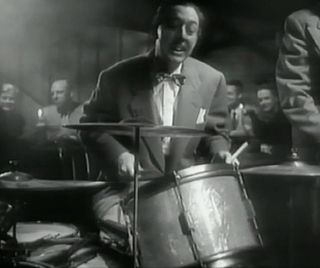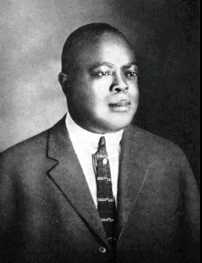
Leon Prima (July 28, 1907, New Orleans – August 15, 1985) was an American jazz trumpeter and the older brother of singer Louis Prima.
Jazz is a music genre that originated in the African-American communities of New Orleans, United States, in the late 19th and early 20th centuries, and developed from roots in blues and ragtime. Jazz is seen by many as "America's classical music". Since the 1920s Jazz Age, jazz has become recognized as a major form of musical expression. It then emerged in the form of independent traditional and popular musical styles, all linked by the common bonds of African-American and European-American musical parentage with a performance orientation. Jazz is characterized by swing and blue notes, call and response vocals, polyrhythms and improvisation. Jazz has roots in West African cultural and musical expression, and in African-American music traditions including blues and ragtime, as well as European military band music. Intellectuals around the world have hailed jazz as "one of America's original art forms".

Louis Leo Prima was an American singer, actor, songwriter, bandleader, and trumpeter. While rooted in New Orleans jazz, swing music, and jump blues, Prima touched on various genres throughout his career: he formed a seven-piece New Orleans-style jazz band in the late 1920s, fronted a swing combo in the 1930s and a big band group in the 1940s, helped to popularize jump blues in the late 1940s and early to mid 1950s, and performed frequently as a Vegas lounge act beginning in the 1950s.
He started on piano before learning the trumpet. His early jobs were with Ray Bauduc, Leon Roppolo, Jack Teagarden, and Peck Kelley (1925–27). He and Sharkey Bonano led the group the Melody Masters in the late 1920s and early 1930s.

Ray Bauduc was a jazz drummer best known for his work with the Bob Crosby Orchestra and their band-within-a-band, the Bobcats, between 1935 and 1942. He is also renowned for his partial composition of Big Noise from Winnetka, a jazz standard.
Leon Joseph Roppolo was a prominent early jazz clarinetist, best known for his playing with the New Orleans Rhythm Kings. He also played saxophone and guitar.

Weldon Leo "Jack" Teagarden was a jazz trombonist and singer. According to critic Scott Yannow of Allmusic, Teagarden was the preeminent American jazz trombone player before the bebop era of the 1940s and "one of the best jazz singers too". Teagarden's early career was as a sideman with the likes of Tommy Dorsey, Paul Whiteman and lifelong friend Louis Armstrong before branching out as a bandleader in 1939 and specializing in New Orleans Jazz-style jazz until his death.
He played in Louis Prima's big band from 1940 to 1946 in New York City. After moving back to New Orleans, he led his own ensemble and managed more than one nightclub, then retired in 1955 to take up a career in real estate.

A big band is a type of musical ensemble that usually consists of ten or more musicians with four sections: saxophones, trumpets, trombones, and a rhythm section. Big bands originated during the early 1910s and dominated jazz in the early 1940s when swing was most popular. The term "big band" is also used to describe a genre of music. One problem with this usage is that it overlooks the variety of music played by these bands.








